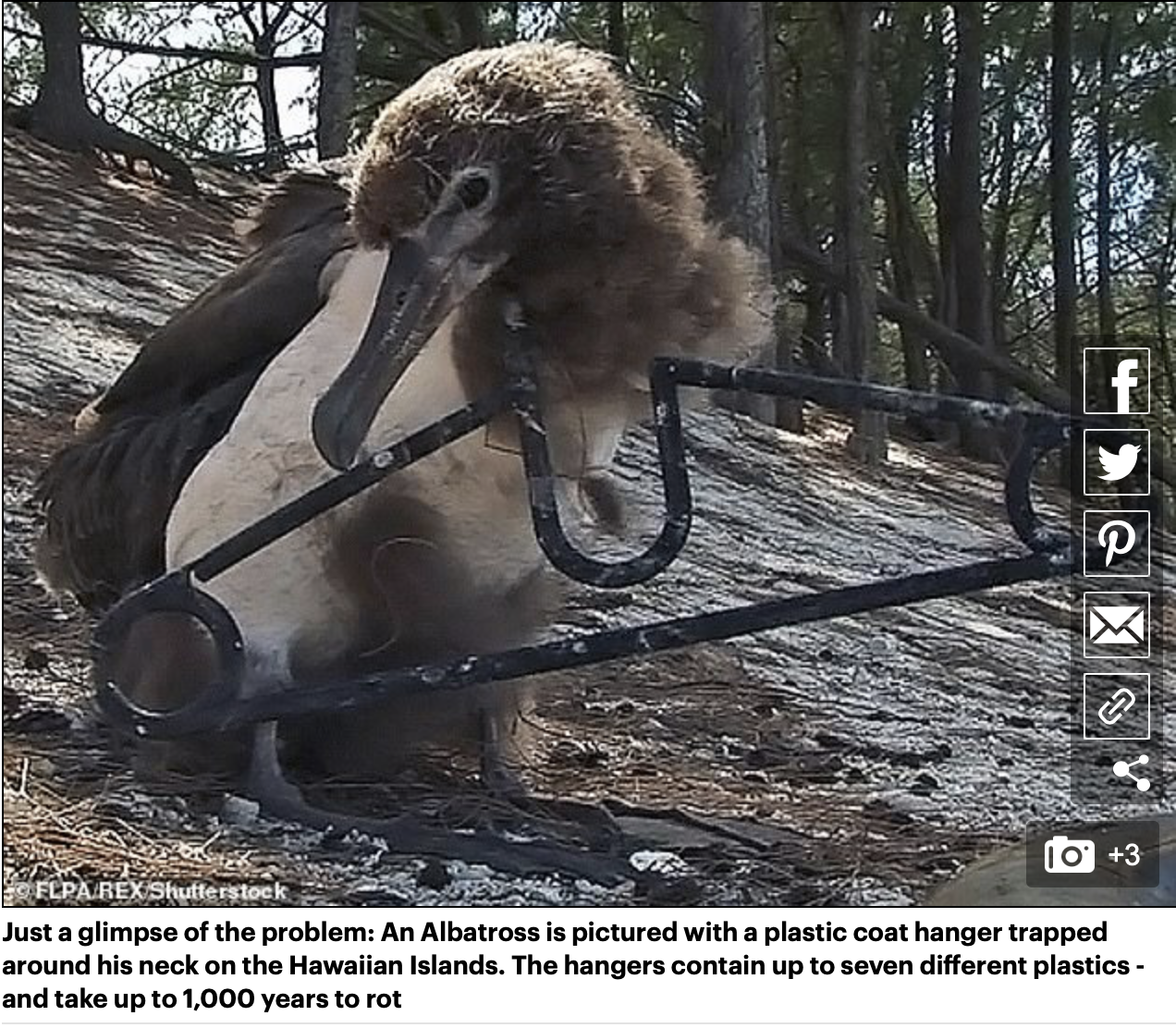Coat hangers leach cancer-causing chemicals, can’t be recycled and maim wildlife. Why do we ignore the plastic menace every bit as toxic as carrier bags?
- Plastic coat hangers could do more damage to the environment than plastic bags, MoS investigation reveals
- Brits take 400 million hangers home every year and they take 1,000 years to rot
- They are harder to recycle as contain up to seven different plastics – leading politicians to campaign for a 5p charge
- M&S dish out plastic hangers for underwear orders and Tesco, Sainsbury’s and Topshop give shoppers the option to keep them
By CLAUDIA JOSEPH FOR THE MAIL ON SUNDAY
PUBLISHED: 22:02, 10 August 2019 | UPDATED: 22:23, 10 August 2019
We know them as a modern nuisance, cluttering waste bins and wardrobes. But an investigation by The Mail on Sunday has established that plastic coat hangers are an environmental menace so serious they could soon outstrip the damage caused by plastic bags, straws and bottles. High-street stores and online retailers hand out hundreds of millions of hangers every year – even though the overwhelming majority cannot be recycled and around half of them end up in landfill or the ocean.
Our investigation shows:
- As many as ten billion new plastic hangers are manufactured every year around the world, with an estimated 400 million taken home by British shoppers or received through the post;
- The hangers we throw away leach dangerous toxins linked to cancer and fertility problems and take up to 1,000 years to rot;
Just a glimpse of the problem: An Albatross is pictured with a plastic coat hanger trapped around his neck on the Hawaiian Islands. The hangers contain up to seven different plastics – and take up to 1,000 years to rot
- Most British clothes stores claim to reuse plastic hangers, yet routinely allow customers to take them away – including needless mini-hangers for underwear;
- Bird and marine life is already affected, with discarded hangers seen lodged around the necks and legs of animals across the world;
- There is growing support for a war on plastic hangers, with politicians, campaign groups and even the hanger industry itself demanding a compulsory 5p charge, similar to the successful levy on plastic bags. The hanger mountain has been described as a scandal ‘hidden in plain sight’.
‘Most clothes can be sold and stored by simply folding them,’ said Louise Edge, of Greenpeace. ‘Too many big retailers are handing out plastic hangers to customers for free when they’re often just pointless packaging. How many people hang their undies in a wardrobe?’
Allison Ogden-Newton, chief executive of environmental charity Keep Britain Tidy, said: ‘It is a scandal that billions of coat hangers every year are simply being dumped in landfill. It’s just another example of a society that is trashing our planet with plastic. Retailers should stop giving them away. And consumers should refuse them at the shop if they don’t plan to reuse them.’
WHY CAN’T THEY BE RECYCLED?
Most plastic hangers are made from a complicated mixture of materials which are impossible to separate at the average recycling depot.
Either they have metal hooks, which can jam recycling equipment, or they contain up to seven different types of low-grade plastics.
Most councils will not collect hangers at the kerbside and many household waste recycling sites refuse to accept them.
Some can technically be recycled – as opposed to being reused – but even then it’s time-consuming and costly.
The hangers are broken down into plastic pellets and moulded into new ones. But the process weakens the plastic to such an extent that hangers can only be recreated two or three times before being discarded altogether. Moreover, there is no easy way to tell which hangers are made from sufficiently high-grade plastic to be recycled, so they end up in landfill as a matter of course.
- ‘It is time for action, not warm words’: Sir Oliver Letwin, the former Tory Cabinet Minister who sits on the Environment, Food and Rural Affairs Committee, says now is the time for a financial levy on the hangers, to minimise the instances where birds are tangled up in the plastic (pictured in stock photo)
WHAT DAMAGE DO THEY CAUSE?
Hangers are cheap to make – 5p for a shirt or jacket hanger and 12p for one with clips. Most are manufactured in China. But the environmental cost is serious.
As the plastic degrades, a hanger leaks substances such as benzene and bisphenol-A (BPA) into ground water in much the same way as other forms of household plastic waste, from cotton buds to plastic bags.
Both these chemicals are considered carcinogenic. Benzene is linked with leukaemia, while BPA is thought to contribute to some breast cancers and affect fertility.
These pollutants not only have a personal, – human cost, they also destroy the planet. According to the Carbon Trust, the carbon released by five billion discarded hangers every year (as they degrade) is equivalent to 3,502 return flights between New York and London, or the use of 93 billion plastic straws.
Hangers that do not make it into properly controlled waste sites can cause untold damage to birds and sea life by getting trapped in gills, wings and legs.
Most unwanted plastic hangers – particularly the small ones such as those used to hold accessories, underwear or shoes – are disposed of in household waste. As a result they end up being sent to landfill sites or incinerated. From landfill sites they can easily blow into the countryside and rivers.
Yet while the menace posed by other forms of plastic waste has been addressed, no measures are in place to control the growing mountain of discarded hangers.
WHAT HAPPENS ON THE HIGH STREET?
Most retailers claim to reuse the majority of their hangers and many have policies in place to do just that. But, in practice, millions of customers are given the hangers for free, whether in stores or from online sales.
Next, for example, says it retains hangers to be reused and that any broken ones are sent off to be recycled. A spokeswoman said: ‘In 2018, 171 tons of hangers were reused within the supply chain and 169 tons were granulated to be remade into new hangers.’
But what actually happens day to day can be different.
At a Next store, our reporter found men’s clothes were displayed on wooden hangers but women’s clothes were on plastic hangers – and these were given away to the customer at the till.
At Primark, plastic hangers were put in a recycling bin at the till while at Tesco, Sainsbury’s and Topshop, the reporter was asked if they wanted to keep the hanger. M&S has come under fire from consumer groups for mailing ‘pointless’ plastic hangers along with online orders for underwear. The company sells more than 60 million pairs of women’s knickers every year and retains the hangers if they are sold in store. But it says it has no way of removing them if they are ordered via the internet.
One customer, after receiving a set of hangers with her underwear, tweeted: ‘What on earth is anyone supposed to do with these? They look destined to end up in a whale’s stomach.’ Another tweeted: ‘Had some undies delivered and each one came on an unnecessary plastic hanger. When will you stop this wasteful practice?’
An M&S spokeswoman said: ‘The issue of plastic is extremely important to us and our customers, and we’re taking steps towards a circular economy where we use less plastic and reuse or recycle any that we do use.’
She added: ‘We’ve reused or recycled more than one billion plastic hangers to date and will continue to go further. We’re actively looking at removing lingerie hangers before sending online orders to our customers.’
AT LAST THE TIDE MAY BE TURNING
It’s Little wonder that environmental campaigners and politicians are demanding change. Sir Oliver Letwin, the former Tory Cabinet Minister who sits on the Environment, Food and Rural Affairs Committee, backs the calls for a financial levy. He said: ‘The huge success of the plastic bag levy has shown how simple steps can reduce the ecological harm done by plastic.’ And Labour MP Angela Smith called for a complete ban on shops handing out plastic hangers, saying: ‘There is no excuse – there are already options available which make it possible for hangers to be processed and made ready for reuse. It is time for action, not warm words.’
And Muna Suleiman, from Friends of the Earth, said: ‘Fast fashion, along with so many environmentally destructive bad habits, has its own problems, but additionally there is an entire world of plastic waste that can be hidden in plain sight as shown by this research. Surely we can do better than this.’
Currently, only 12 per cent of plastic hangers are reused by stores but the hanger manufacturers say they are attempting to tackle the problem.
Braiform, a British hanger-maker, operates in 30 countries around the world and supplies many well-known high-street stores. It has already developed a system for reusing hangers, charging stores for cleaning used hangers and sending them back.
Braiform uses sophisticated technology at its main British depot in Sheffield to sift through 425,000 discarded hangers a day, dividing them into different types so they can be reused if possible, or else recycled.
‘We believe that it is better to reuse rather than recycle them,’ says Dr Jim Collingham, who leads the programme. ‘It’s green, cost-effective and hassle-free, lowering transport costs, import fees and carbon emissions.’
Braiform claims to have reused nine billion hangers so far.
It is the company’s new analysis which has exposed the sheer global scale of the problem and Braiform is lobbying the Government to introduce a plastic hanger tax.
Such a scheme has been hugely successful in reducing the number of plastic bags used by consumers.
Introduced in 2015, it has led to an 85 per cent drop in single-use plastic bags – down from 140 bags for the average person each year to just 25.
‘Ten years ago, retail managers told me the only people who came into stores with their own carrier bags were shoplifters,’ said Dr Collingham. ‘Now no one goes shopping without their own bags. We hope to instil the same ethos into the way shoppers look at hangers.’
But the problem will remain as long as shops and online retailers give plastic hangers to customers at the tills.
- British people take around 400 million hangers home each year and this is not helped by high-street stores who give customers the option – Tesco, M&S, Sainsbury’s and Topshop were guilty culprits in the Mail on Sunday investigation.
SO WHAT CAN YOU DO ABOUT IT?
The advice is simple: don’t take the hanger home unless you really need it and are happy to reuse it. When sent a useless plastic hanger with your online shopping, write to the retailer or post on social media, and return the hanger to the store if possible.
‘Retailers need to keep them in the supply chain and stop handing them out,’ says Braiform.
‘We reuse 12 per cent of plastic hangers but we want to push that up to 50 to 60 per cent. We need people to stop making that decision at the till. Don’t take it home because you’re taking it out of the system and the consumer becomes responsible but governments don’t have a system in place to collect them.
‘So the smarter and quicker way would be to put pressure on the retailer to reuse the hanger.’
End of Article.
Clippie fixed all of the issues
Clippie is an eco-friendly anti-tangle clothing hanger that is designed to be a lifetime product. It holds any garment or combination of outfit on a single hanger design. Made from recycled materials and fully recyclable through the commercial and domestic waste systems.
Whilst global manufactures are trying to reuse and recycle, they scrap 10% of every hanger collected from the major stores that then have to be entered into the UK’s recycling infrastructure, causing blockages and damage to equipment due to tangling. The major retailers only account for 28% of garment sales in the UK, so the global manufacturers have no control over 72% of their product.
The Clippie hanger was designed to move through the waste infrastructure so it does not cause damage to infrastructure. It increases material recapture, due to its unique design, shape and material type and is designed to float, so if it is gisaguarded carelessly it can be recaptured and reused from the ocean. But more importantly, you buy a Clippie hanger for lifetime use. Clippie is the only type of hanger you will ever need when doing your ironing.
Visit www.clippie.co.uk to find out more.




